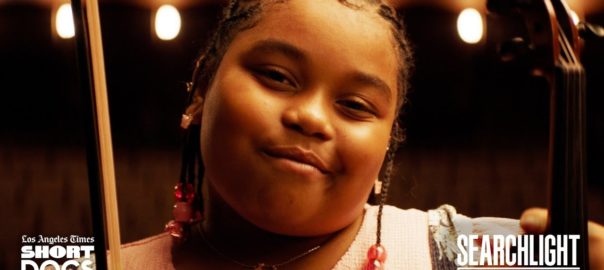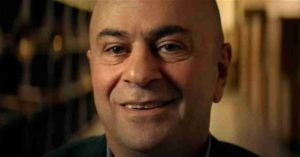In advance of this upcoming 96th annual Academy Awards ceremony — which begins at 4pm this Sunday, an hour earlier than usual — please find trailers for the ten 2023 films garnering recognition in Hollywood as the best films of the year.




In advance of this upcoming 96th annual Academy Awards ceremony — which begins at 4pm this Sunday, an hour earlier than usual — please find trailers for the ten 2023 films garnering recognition in Hollywood as the best films of the year.




Porché Brinker plays violin in The Last Repair Shop, which tells the story of technicians who repair public school musical instruments in Los Angeles free of charge, and the kids who play them.
Only one documentary short nominee this year has the full balance of human interest, social relevance and aesthetic appeal that tends to make a winner.
It’s the Oscar-nominated The Last Repair Shop, directed by Halifax filmmaker Ben Proudfoot, who won two years ago for The Queen of Basketball, a New York Times Opinion production, and the composer Kris Bowers, who was nominated with Proudfoot for A Concerto Is a Conversation, another Times Opinion documentary.
This time, both have made their documentary with The Los Angeles Times.
“In a warehouse in the heart of Los Angeles, a dwindling handful of devoted craftspeople maintain more than 80,000 student musical instruments, the largest remaining workshop in America of its kind. In the film, you’ll meet four unforgettable characters whose broken-and-repaired lives have been dedicated to bringing so much more than music to schoolchildren in Los Angeles.”
The Last Repair Shop is a great film, a moving, elegiac and engaging must-watch if you’re a family, a teacher or are dedicated to public education.
The entirety of the film is available on YouTube, or on Disney+. If you have a Smart TV, you’ll absolutely want to watch the film on the bigger screen.

Steve Bagmanyan is the supervisor of the L.A. Unified School District’s Musical Instrument Repair Shop
In The Last Repair Shop, the repair shop of the title fixes instruments for the city’s school district, the film relating the story of the L.A. Unified School District’s Musical Instrument Repair Shop — the last public school district in the U.S. to service musical instruments free of charge — where 11 technicians service about 6,000 instruments each year for more than 1,300 schools across the city.
Steve Bagmanyan, supervisor of the repair shop: “Music can do wonderful things. Music can change lives. Music can take you off the streets. Music can fill you up with joy, with happiness.”
The opening text says the service has been offered to students for decades.
The Last Repair Shop presents the recollections of four specialists (in strings, brass, woodwinds and piano), who share their experiences of immigration, of coming to terms with being gay and even of opening for Elvis in a bluegrass band, a long-term payoff of buying a $20 fiddle at a swap meet.

Porché Brinker in Ben Proudfoot’s Oscar-nominated documentary short film, The Last Repair Shop.
Schoolchildren further testify to how music affects their lives. The contrast gives The Last Repair Shop a gentle inter-generational poignance, as it makes an uninflected case for the importance of financing public school music education.
It’s not just the students whose lives have been changed by music.
The people who repair the instruments all have their own stories to tell — whether it’s about travelling the country with a $20 fiddle from a flea market, leaving home to chase the American dream, growing up gay in the ’70s, or even surviving ethnic cleansing.
And at the centre of each story is music, and a desire to repair — and to heal.
“We all have broken relationships, broken promises. The world is, in many ways, broken. And I think what these people stand for is an optimism that sometimes you can make things whole again with enough effort and care and patience,” Ben Proudfoot says.
“You can’t fix everything that’s broken. But sometimes you can. And for that one time out of 10 where you can, it’s worth doing. And I think there’s not too many lessons better than that.”

The Last Repair Shop is a love letter to the role of music in public education, a testament to seeing how broken something may be — and fixing it anyway.
And it’s a tribute to those who toil away, largely without recognition, in service of the important task of helping the next generation realize their dreams.

Every three decades, or roughly once a generation, Hollywood experiences a seismic shift. The transition from silent films to talkies in the 1920s. The rise of broadcast television in the 1950s. The raucous cable boom of the 1980s.
It’s been happening again, for some while now, as most folks have observed.
The long-promised streaming revolution — the next great leap in how the world gets its entertainment — is finally here in all its glory.

Warner Bros. Discovery studio in Burbank, Califoria, one of the oldest and largest Hollywood studios
In the 115-year history of the American film industry, never has so much upheaval arrived so fast and on so many fronts, leaving many writers, directors, studio executives, agents and other movie workers disoriented and demoralized. These are melodramatic people by nature, but talk to enough of them and you will get the strong sense that their fear is real this time.
“The last four years have shaken the movie business to its bones,” Jason Blum, the powerhouse producer whose credits range from The Purge series to Get Out and the BlacKkKlansman.” recently told Los Angeles Times film writer, Justin Chang.

Streaming, of course, has been disrupting the entertainment business for some time. Netflix started delivering movies and TV shows via the internet in 2007.
In 2024, however, the shift towards streaming has greatly accelerated, with Netflix, Disney+, Apple TV, Crave/HBO, Prime Video, YouTube Premium, CBC Gem and Kanopy, among other streaming platforms, competing for your movie attention.

Adding to Hollywood’s misery is the abrupt changing of the guard in Hollywood’s highest ranks. Nine of the top 20 most powerful people in show business have left their jobs, including Universal’s Ron Meyer, whose 25-year Universal career ended in 2021. David Zaslav is now in firm control of Warner Bros. Discovery, with Kevin Tsujihara exiting his role as chairman and CEO of Warner Bros. Entertainment, a job he held for six years. Paramount Global CEO Jim Gianopulos was removed, in favour of Bob Bakish, also now on the way out, with the company up for sale.
“It’s not clear that full normal will return even well into the fourth quarter of 2024,” Warner Bros. Discovery Chairman David Zaslav, told Chang in an interview on how Hollywood is faring against the streaming wars, and the slow recovery from the pandemic.

An empty cinema with no patrons. Is this picture an indication of what presages cinema in the future?
Will young people — trained during the pandemic to expect instant access to new movies — get into the habit of going to the movies like their parents and grandparents did? Generation Z forms a crucial audience: About 33% all moviegoers in 2023 were under the age of 24, according to the Motion Picture Association.
“Cinema as an art form is not going to die,” Michael Shamberg, the producing force behind films like Erin Brockovich and The Big Chill” told the New York Times’ Manohla Dargis in a recent interview. “But the tradition of cinema that we all grew up on, falling in love with movies in a theatre, is over.”
In other words, the art may live on, but the myth of big screens as the be-all and end-all is being dismantled in a fundamental and perhaps irreversible manner.


There were a smattering of big sales and buzzy premières at this year’s 40th edition of the Sundance Film Festival, held each January since 1984 in Park City, Utah.
Even so, it’s impossible to ignore the fact that the independent film business Sundance has so long championed is suffering from an identity crisis.
The box office for art-house movies has yet to regain its pre-COVID stride.
Desperate for content, streaming services once paid inflated prices for films débuting at Sundance . Now they’re conservative in their spending.
In this era of economizing, the all-night bidding wars that made Sundance sizzle are a thing of the past, not a great sign of the financial health of the industry.
Yet there was still plenty to celebrate.
Movies like Super/Man: The Christopher Reeve Story and Will & Harper received emotional standing ovations, while A Real Pain and It’s What’s Inside defied the odds to score multimillion-dollar deals.
As it enters its fifth decade, Sundance hasn’t lost its ability to excite audiences.
But, clearly, Sundance needs to make adjustments to the way it conducts itself in order to keep up with the changing times, if the indie festival is going to survive.
 Actor / Oscar nominee, first time director Jesse Eisenberg and Kieran Culkin star in A Real Pain
Actor / Oscar nominee, first time director Jesse Eisenberg and Kieran Culkin star in A Real Pain
A Real Pain, starring Jesse Eisenberg and Kieran Culkin as cousins who travel to their grandmother’s native Poland to partake in a Holocaust tour, scored rave reviews and won the Waldo Salt Screenwriting Award for Eisenberg, the film picked up by Searchlight for a whopping $10 million early on in the Festival. A Real Pain will receive a theatrical release later this year, and may be Oscar bound next year.

Focus Features snatched up Sundance favourite Dìdi, directed by Academy Award nominee Sean Wang, the film telling the story of a 13-year-old Taiwanese American boy (Izaac Wang) who spends his last summer before high school learning how to flirt, skate, and get along with his mom (Joan Chen). Dìdi, set in 2008, won Sundance’s Audience Award and the Special Jury Prize drama award.
 Richard Roundtree and June Squibb star in director Josh Margolin’s ode to his grandma, Thelma
Richard Roundtree and June Squibb star in director Josh Margolin’s ode to his grandma, Thelma
Magnolia Pictures snagged the elderly-buddy comedy Thelma, the tale of a 93-year-old grandma (June Squibb) who endures a harrowing journey across Los Angeles after she’s conned by a phone scammer pretending to be her grandson (Fred Hechinger). The film also stars Richard Roundtree as her companion, as the two seeking retribution. Parker Posey, Clark Gregg, and Malcolm McDowell co-star.

The documentary Super/Man: The Christopher Reeve Story, which sold for $15 million to Warner Bros. Discovery, follows Christopher Reeve on how he found his life’s purpose after he suffered from an equestrian accident that left him paralyzed.
 Maisy Stella and Aubrey Plaza star in Canadian director Megan Park’s new film, My Old Ass
Maisy Stella and Aubrey Plaza star in Canadian director Megan Park’s new film, My Old Ass
Director Megan Park’s My Old Ass will head directly to Amazon’s Prime Video this spring, the film telling the story of high-school senior (Maisy Stella), who meets the adult version of herself (Aubrey Plaza) right before she heads off to college.

Skywalkers: A Love Story, directed by Jeff Zimbalist, was acquired by Netflix. The documentary follows Angela Nikolau and Ivan Beerkus, a couple from Moscow, who saved their careers and relationship by climbing really tall buildings, specifically the world’s last super skyscraper, to perform an acrobatic stunt.
The Will Ferrell documentary Will & Harper was also picked up by Netflix, the road trip film about two Saturday Night Live alumni, Ferrell and former SNL head writer Harper Steele, who reconnect after Steele comes out as a trans woman. The duo set out together for a cross-country trip, during which they talk in depth about their friendship and the experience of being trans in America.
Sundance hasn’t been a Festival that’s been synonymous with Academy Awards attention, though recent iterations have churned out Oscar favourites like Best Picture winner CODA, Lee Isaac Chung’s semi-autobiographical Minari, and Korean-Canadian director Celine Song’s wistful dramatic début, Past Lives.
Although A Real Pain and Super/Man were critically embraced, there’s a question as to whether they have enough buzz to stay in the conversation until next year.
What Sundance may have lacked in stature this year, it made up for in scares.
Steven Soderbergh’s twisty thriller Presence, which Vulture critic Bilge Ebiri wrote is “the best thing Soderbergh’s done in ages,” is a haunted-house movie seen through the eyes of the ghost. Neon picked up the film’s distribution rights.
Zombie slasher movie In a Violent Nature and other movies about things that go bump in the night were all the rage in Park City.

It’s What’s Inside, a horror story about a pre-wedding party from hell, landed at Netflix in a massive $17 million sale. Along with the haunted psychodrama I Saw the TV Glow — which arrived at Sundance having secured theatrical distribution from A24 — both films became this year’s conversation starters on Main Street.

Justice Smith and Brigette Lundy-Paine star in writer-director Jane Schoenbrun’s I Saw the TV Glow
Nothing beats a good fright.

In the Summers, an independent film about two sisters navigating fraught summer visits with their father, won the Grand Jury Prize at this year’s Festival, as well as Best Director for Alessandra Lacorazza.

Shuchi Talati’s début feature, Girls Will Be Girls, about a mother’s intervention in her teenage daughter’s budding romance that creates an unexpected emotional love triangle, landed the Audience Award for World Cinema, as well as the World Cinema Dramatic Special Jury Award for Acting, for Preeti Panigrahi.

Porcelain War landed the award for U.S. Documentary Grand Jury Prize for Brendan Bellomo and Slava Leontyev, the film an intimate reflection on making art in wartime Ukraine.

The U.S. Documentary directing award was awarded to Julian Brave NoiseCat and Emily Kassie for Sugarcane, an enlightening and infuriating look into systematic abuse at an Indian Residential School.

The World Cinema Documentary directing award went to Benjamin Ree for Ibelin, which focuses on Norwegian gamer Mats Steen. Steen’s parents mourned what they thought had been a lonely and isolated life after their son died of a rare, degenerative muscular disease at age 25. They later received messages from online friends all around the world who knew Steen for his beloved World of Warcraft avatar, Ibelin Redmoore.

All the films mentioned in today’s VanRamblings column will find their way onto your local multiplex screen at some point this year, or are scheduled to air on Netflix, Prime Video or another streamer.